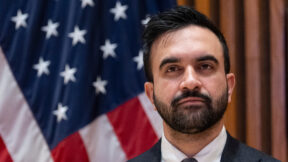George Stephanopoulos Offers His Take on How to Cover Trump: ‘Everyone In The Media is Struggling With This’

Photo: Alex J. Berliner/ABImages via AP Images
George Stephanopoulos, a politico-turned-journalist who now co-anchors ABC’s Good Morning America as well as This Week on Sundays, knows the complicated dance between the media and politics. While talking to David Axelrod, he outlined the media’s ongoing “struggle” to cover former President Donald Trump, who tried to overturn the 2020 election and interrupt the country’s peaceful transition of power — and is now the Republican party’s presumptive nominee.
While appearing on Axelrod’s podcast The Axe Files in an episode released Thursday, Stephanopoulos discussed his new book The Situation Room, about the history of victories, tragedies, and tension that have taken place at the White House Situation Room over the decades since it was built in 1961. Among the tense moments involving the storied Sit Room was January 6, 2021, when the certification of the election of President Joe Biden took place as Trump-supporting insurrectionists stormed the Capitol.
Stephanopoulos recounted a shocking conversation he had with Mike Stiegler, who served as a desk officer for the Situation Room in 2020 where he had direct contact with the Secret Service:
I asked him, “What’s the most harrowing part of that day?” And he, you know, his his whole face fell, his voice got very soft, and he said how close we came to losing the vice president. So, he’s in contact with the Secret Service, who, they believe the vice president could be getting murdered at any moment. Because of that, they are starting to implement what is called the Continuity of Government orders. And for context, you have to understand what the Continuity of Government orders are. These were ordered by Dwight Eisenhower at the height of the Cold War, to figure out how the United States government would survive a nuclear attack. Setting up separate situation rooms. Setting up separate command centers. Dealing with the line of succession.
And in the course of the 60-plus years of the Situation Room, they had dealt with assassinations. They had dealt with scares of nuclear attacks. They had dealt with the terror attacks of 9/11. They had dealt with attempted assassination. They dealt with three wars, including the longest war in American history. But on this day, Mike Stiegler and the duty officers in the room are dealing with an insurrection against our own government, inspired by the man who’s sitting upstairs in a study off the Oval Office, sipping Diet Coke and kind of cheering everybody on on TV, and sending out tweets attacking [former Vice President] Mike Pence. It’s an unimaginable situation. Absolutely unimaginable.
And not once — I’d asked Mike Stiegler this many times — not once on that day did Donald Trump call down and say, “What’s happening down on the Capitol? What’s going on with my vice president? What can I do to stop this?” I mean, we’ve all learned that since then, but think how used to that we’ve all gotten. That fact alone is disqualifying. Should be, you would believe.
This led Axelrod to ask Stephanopoulos about his decision not to have 2020 election deniers on his shows, including lawmakers who did not vote to convict Trump when he was impeached by the House for inciting an insurrection, saying, “It could have all ended on that day.” But instead, the lie that the 2020 election was stolen not only survived, it became the belief of the majority of Republican voters, and a third of Americans, who put Trump back in the running for 2024.
Which puts the media in the position of having to cover Trump as a major party presidential candidate, following all the journalistic ethics of fairness that apply to those candidates — even while Trump blatantly tried to upend American democracy:
Stephanopoulos: Everyone in the media is struggling with this. For me, and I’ve said this, on my program, I think it’s important to provide the context. I mean, we’ve never, not once before in American history, have we had a president indicted or impeached for trying to overturn an election. Not once. Not once have we had a president who refuses to accept the results of the next election. That’s before we get to all of the other legal issues, all the other civil suits, everything else. Just focus on that right there.
Axelrod: Right.
Stephanopoulos: And I think what our job is to not lose sight of that because the peaceful transfer of power is fundamental.
Axelrod: Fundamental, yes, but so too is covering a major party candidate who could be the next president.
Stephanopoulos: And I just think that what we have to make sure is that we don’t equate trying to overturn an election with tax policy. You can’t pretend they exist on the same level. You have to cover it all. I agree with all that. But within especially within, when you have limited time, I think you have to make sure you’re putting things in context and emphasizing the priority of the various issues.
Listen to the full podcast on CNN.





Comments
↓ Scroll down for comments ↓